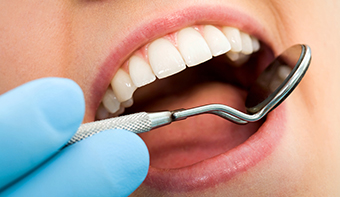 09 Jul 2022
09 Jul 2022
Tooth decay is a common yet serious condition that can lead to many complications for your teeth, gums, and overall health. Thankfully, there are many ways to treat tooth decay and stop it from progressing to its more dangerous advanced stages. Keep reading to learn more about tooth decay and its symptoms and learn some tooth decay tips from our expert team.
What is Tooth Decay?
Tooth decay is a form of dental disease that can damage the surface and internal structures of your teeth. It is caused by oral bacteria that feed on the sugars in the food you eat. This causes them to secrete acids that break down the enamel and other structures of your teeth. The soft, sticky craters this process leaves behind are known as dental cavities.
Tooth decay can show up in three places:
- The Enamel. Early decay softens the hard enamel on your teeth, allowing bacteria to begin burrowing deeper inside. Some dentists will advise you not to treat decay at this stage, preferring to watch the spot and see how it progresses. In some cases, decay will slow or stop.
- The Dentin. When decay eats all the way through your enamel, it will spread to the dentin below. Tooth decay that reaches this stage must be treated with a filling or crown.
- The Pulp. Decay that is not treated when it reaches the dentin will eventually spread to the pulp, the innermost layer of your teeth. At this stage, tooth decay can cause severe pain and life-threatening infections. Prompt treatment is critical.
Symptoms of Tooth Decay
Some common signs of tooth decay include:
- Toothache
- Discoloured areas on your tooth (may appear brown, gray, black, dark yellow, or even white)
- Sensitivity to hot, cold, and sweet foods and drinks
- Visible holes in a tooth
Note that these problems may be caused by other dental issues as well. Always see a dentist when you experience any symptoms of dental disease.
Diagnosis
Tooth decay is usually diagnosed during routine dental exams. You may also visit your dentist for an emergency appointment if you have a severe toothache that may be caused by advanced decay.
During your appointment, your dentist will ask you about any symptoms you have experienced and how long they have been going on. They will also examine your teeth and apply a metal probe to any suspicious spots to see if the probe sticks. If it does, decay is likely present in this area.
In most cases, your dentist will also x-ray your teeth. This will help them see inside your teeth, allowing them to determine the extent of the damage and discover any hidden decay.
Treatment Options
There are several different ways to treat tooth decay. Depending on your needs, your dentist might recommend:
- Fluoride Treatments. Early tooth decay can sometimes be treated with fluoride treatments, including foams, gels, and topical applications.
- Fillings. Most tooth decay needs to be drilled out of the tooth to keep it from spreading. When this is done, a dental filling is placed in the tooth to fill in the lost tooth structure.
- Crowns. Teeth with extensive decay may be too damaged to remain structurally sound when filled. Covering them with a crown helps reinforce their strength and prevents them from cracking and breaking.
- Root Canals. A tooth with very deep decay may need a root canal to remain viable. This procedure will ensure that all the decay is removed from the tooth’s pulp and will not cause an infection in the future.
- Tooth Extraction. When decay has destroyed almost all of a tooth’s structure, it becomes impossible to repair. The tooth must be extracted and replaced with an implant, denture, or bridge.
Is Tooth Decay Reversible?
Early tooth decay can sometimes be reversed, but only with very good care. You will need to keep the area with the decay extremely clean and apply additional fluoride to help your tooth rebuild its enamel.
If you have early decay that you want to try to reverse, ask your dentist for guidance. They can offer tips on how best to do it and apply high-strength fluoride treatments to help you achieve this goal.
Not all cavities can be treated this way, and the treatment is not always successful when attempted. Once decay has broken through to the dentin, it cannot be reversed. Act quickly to give yourself the best possible chance of healing your early decay.
Complications
Tooth decay can lead to many unpleasant complications if it is not treated, including:
- Gum Disease. The bacteria that cause tooth decay can also cause gum disease, a serious condition that leads to bleeding, painful gums, and bone loss in the jaw. If you lose too much bone, your teeth may become unstable or even fall out.
- Infections. If tooth decay spreads all the way into your tooth’s pulp, the tooth may become infected. This is a severe problem that can cause immense pain, alarming abscesses, and even death.
- Tooth Loss. Untreated tooth decay will always lead to tooth loss. Treating cavities early is the best way to keep your teeth healthy for life.
When Should You See a Dentist?
You should always see your dentist if you notice any symptoms of tooth decay. Your symptoms may well pass quickly or be attributed to other problems, but it is best to investigate the matter to be sure. The sooner you get treatment for any cavities you may have, the more tooth structure you will be able to preserve.
Get Outstanding Care for Tooth Decay from the Best Dentist in Mississauga
 Tooth decay can strike anyone at any time, but regular care from good dentists can keep it at bay. If you are worried about tooth decay, visit Trillium Smile Dentistry – the best dental clinic in Mississauga for dental health and cosmetic enhancements. Whether you need treatment for existing tooth decay or want to learn more about tooth decay prevention, our team will give you the care and knowledge you need to keep your teeth healthy. Contact us at 905-828-9894 or book an appointment online today.
Tooth decay can strike anyone at any time, but regular care from good dentists can keep it at bay. If you are worried about tooth decay, visit Trillium Smile Dentistry – the best dental clinic in Mississauga for dental health and cosmetic enhancements. Whether you need treatment for existing tooth decay or want to learn more about tooth decay prevention, our team will give you the care and knowledge you need to keep your teeth healthy. Contact us at 905-828-9894 or book an appointment online today.
Also Read: A Complete Guide to Tooth Decay
